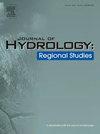Conflict network of farming communities with the multi-stakeholders of a water basin: Insights from the ZayandehRud Basin in Iran
IF 5
2区 地球科学
Q1 WATER RESOURCES
引用次数: 0
Abstract
Study region
The Zayandehrud Basin, Iran.
Study focus
Water conflict refers to disputes among diverse stakeholders who govern or depend on common water resources. This research examines the conflict network of farming communities with other stakeholders through a case study or stakeholder analysis using semi-structured interviews with 26 water experts and 25 key informant farmers and a survey by interviewing 301 randomly selected farmers in the basin.
New hydrological insights for the region
Farmers have faced increased vulnerability, conflicts and water scarcity, exacerbated by the escalating demand for water from municipalities and industries. The Social Network Analysis (SNA) reveals that this complex conflict exists within and across upstream and downstream sub-basins (conflict density between 0.767 and 0.221). The most pronounced conflicts arise with national governmental stakeholders, inter-basin water transfer companies, and large industries (conflict closeness=1.000). Farmers perceive these stakeholders as diminishing their water allocation through policies or heightened water demand. Strong or moderate conflicts occur across the upstream and downstream areas, primarily with the government, municipal bodies, and the farmers of other sub-basins. In addition to the inter-sectoral disputes of agriculture with municipalities and industries, farmers within each specific area tend to hold stakeholders of other areas accountable for water scarcity. These conflicts can hinder integrated water governance by involving multi-stakeholders from different sub-basins. The intensified water conflicts can worsen water scarcity and social conflicts.
农业社区与流域多方利益相关者的冲突网络:来自伊朗zayandhrud盆地的见解
研究区域:伊朗Zayandehrud盆地水资源冲突是指管理或依赖共同水资源的不同利益相关者之间的争端。本研究通过对26位水资源专家和25位关键线人农民进行半结构化访谈的案例研究或利益相关者分析,以及对流域随机选择的301位农民进行调查,考察了农业社区与其他利益相关者的冲突网络。农民面临着越来越多的脆弱性、冲突和水资源短缺,市政和工业对水的需求不断增加加剧了这些问题。社会网络分析(SNA)表明,这种复杂的冲突存在于上下游子流域内部和之间(冲突密度在0.767 ~ 0.221之间)。最明显的冲突发生在国家政府利益相关者、跨流域调水公司和大型工业之间(冲突亲密度= 1000)。农民认为这些利益相关者通过政策或增加水需求减少了他们的水分配。在上游和下游地区,主要是与政府、市政机构和其他子流域的农民之间发生强烈或中度的冲突。除了农业与市政当局和工业之间的部门间争端外,每个特定地区的农民往往会要求其他地区的利益相关者对水资源短缺负责。这些冲突可能会阻碍来自不同子流域的多方利益相关者的综合水治理。愈演愈烈的水冲突会加剧水资源短缺和社会矛盾。
本文章由计算机程序翻译,如有差异,请以英文原文为准。
求助全文
约1分钟内获得全文
求助全文
来源期刊

Journal of Hydrology-Regional Studies
Earth and Planetary Sciences-Earth and Planetary Sciences (miscellaneous)
CiteScore
6.70
自引率
8.50%
发文量
284
审稿时长
60 days
期刊介绍:
Journal of Hydrology: Regional Studies publishes original research papers enhancing the science of hydrology and aiming at region-specific problems, past and future conditions, analysis, review and solutions. The journal particularly welcomes research papers that deliver new insights into region-specific hydrological processes and responses to changing conditions, as well as contributions that incorporate interdisciplinarity and translational science.
 求助内容:
求助内容: 应助结果提醒方式:
应助结果提醒方式:


